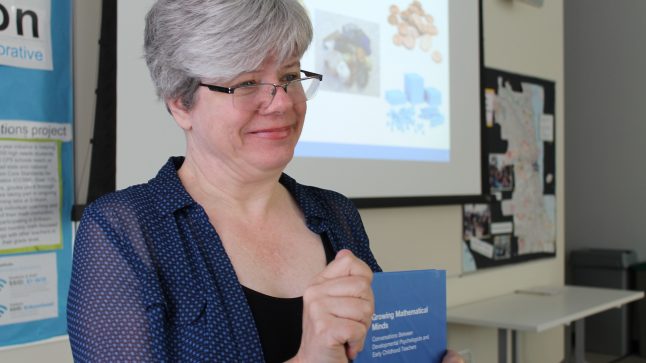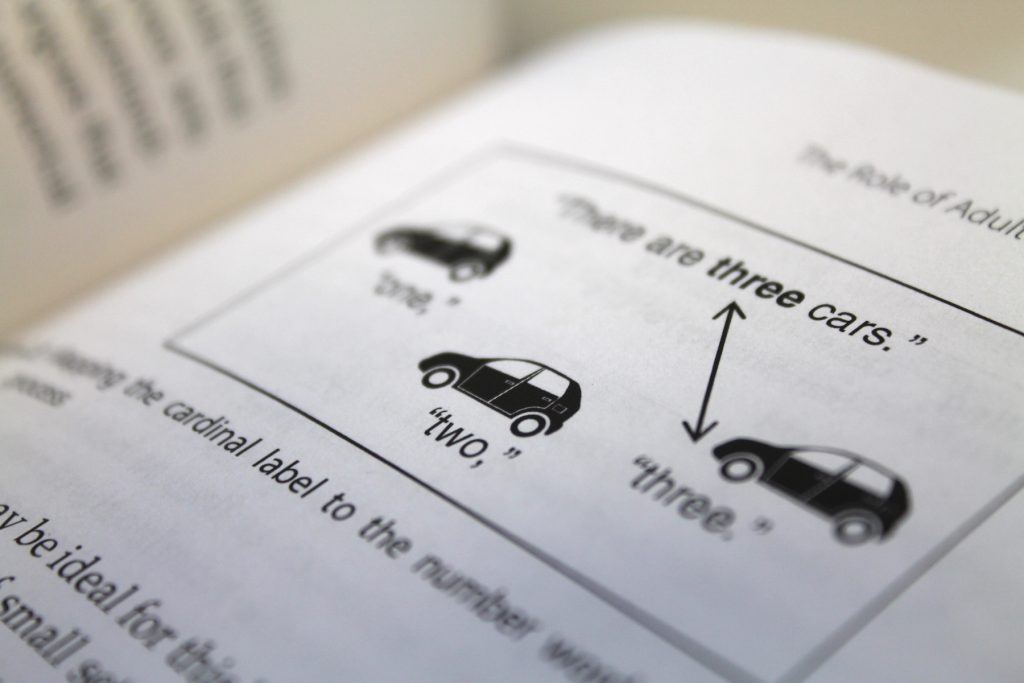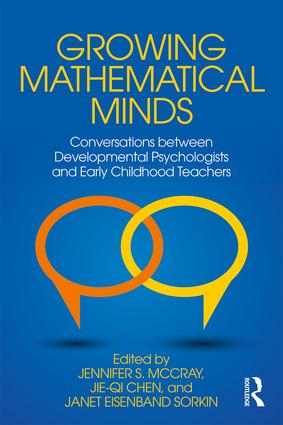Series: About the Collaborative
New Book Connects Early Math Teaching with Developmental Research

A new book released in August 2018 from the Collaborative examines the connections and questions that arise from discussing math experiences in early childhood settings and the research into children’s mathematical learning. Growing Mathematical Minds documents important research with leading scholars in developmental psychology along with classroom teachers working in the field today. It creates a discussion between these groups, hoping to create a shared understanding that is often lacking between research and practice.
Edited by Jennifer McCray and Jie-Qi Chen of Erikson Institute and Janet Eisenband Sorkin of the University of Chicago, the book is both unique in its format and ambitious in its goal to spark interdisciplinary conversation.
We discuss with Dr. Jennifer McCray her experiences with developing such a book.
How much does a classroom teacher in, say, kindergarten or 1st grade benefit from knowing the research behind the topic they are teaching? Why isn’t it enough just to be told what best practices are?
The answer to this question goes directly to the nature of teaching and learning: what is it? In our view at Erikson, teaching and learning is an interactive exchange of information and ideas that results in the development of new understandings and knowledge. Just conveying information is not sufficient for the excellent educator. Students (children) need structured opportunities to employ ideas and conduct experiments related to what they are learning if they are to “believe in” the end result. If the learning experience requires this kind of engagement, then it follows that the teacher must be an artist—creative—able to take in information about what learners currently know and understand, and find powerful ways to link that to the ideas they wish to convey. This, in turn, requires that teachers be excellent observers of young children. The very young are not good at telling you exactly what they know about and understand; that kind of meta-cognition is beyond them. So coming to the learning situation with some ideas about what course the content follows allows a teacher to adjust and elaborate on the fly. If you understand more about the process children go through as their thinking develops, you are better equipped to support different stages of their learning.
Part of what the book does is allow everyone (researchers and psychologists included) to hear teachers’ voices directly. What part of the research raises the most challenges for teachers? What important teaching questions should the next round of studies address?
How do researchers and developmental psychologists benefit from a discussion like what is found in the book? What can they learn from classroom teachers about early mathematics?
Researchers and developmental psychologists who are interested in early math learning want the knowledge they generate to be useful to teachers. Part of what the book does is allow everyone (researchers and psychologists included) to hear teachers’ voices directly. What part of the research raises the most challenges for teachers? What important teaching questions should the next round of studies address?

Which chapter or topic did you personally learn the most from that you didn’t already know?
I learned the most about gesture and math learning—I was lucky to work with Mary Hynes-Berry on our team and to interview Susan Goldin-Meadow of the University of Chicago about this topic. This research is so new, and so startling. For example, the fact that when children are on the cusp of being able to “conserve” quantity, they are often able to show their understanding in their gestures prior to being able to do so in language. This finding has lots of important implications for how teachers assess children, but it also suggests that gesture provides an additional “pipeline” to what the mind is capable of. The further finding that how teachers gesture as they teach mathematics makes an impact on what children learn is clearly also fundamental, and probably needs further study.
Would you recommend a teacher read this book as an introduction to early mathematics, should they read this as a companion to something else, or should it be read after learning the fundamentals of early mathematics like is found in Big Ideas of Early Mathematics: What Teachers of Young Children Need to Know?
I think the book is useful for the teacher who wants to push herself, to learn more. Most early childhood teachers have little exposure to this kind of research — it is “mind-expanding” stuff. It could be very useful for teachers who are interested in “action research; ” that is, in thoughtfully planning and trying out different interventions in their classrooms to see what will happen as a result, and documenting and sharing their results. No, it should not be an introduction to early mathematics. It is for the teacher who wants to grow beyond that.
This research is so new, and so startling. For example, the fact that when children are on the cusp of being able to “conserve” quantity, they are often able to show their understanding in their gestures prior to being able to do so in language. This finding has lots of important implications for how teachers assess children, but it also suggests that gesture provides an additional “pipeline” to what the mind is capable of.
Having been both an early childhood educator as well as researcher, what do you think are the biggest misconceptions about both of those roles?
I’m not sure that most researchers understand the passion, dedication, and creativity that make an excellent early childhood teacher. People who dedicate their lives to working directly with young children have to have patience, energy, and stamina, but many of them are also brilliant, intuitive, and extremely thoughtful. Because of this, these teachers can be an important resource for researchers who want their work to improve teaching and learning. By the same token, I don’t believe most teachers understand how often the things that drive researchers to understand how children learn are driven by a real desire to improve teaching and learning for all children. Most researchers desperately hope their work will find useful application, but practice itself is not their strength, so they focus on what they can do well. And really, that’s what we all must do. The important thing is that we keep talking to one another, so that the good work we do can be shared.

Growing Mathematical Minds
Available now
Our latest book Growing Mathematical Minds bridges research and practice. We translate research on early mathematics from developmental psychology into terms that are meaningful to teachers and readily applicable in early childhood classrooms.